
Wyland Stanley Bulletin press car: Mitchell auto at Yosemite National Park 1920

Makes it easier to bring jobs back home, too.
• OK, I get it: Companies Clamor for Cheap Labor, Fed Delivers (WS)
Despite all the frothy excitement about the stock market’s new highs, and the drooling today over the new highs reached by Housing Bubble 2, exceeding the prior crazy highs of Housing Bubble 1 even according to the Case-Shiller Index, and despite eight years of super-low interest rates, and a million other things that are hyped constantly, median household incomes, the crux of the real economy, is still a dreary affair. Sentier Research released its median household income measure for October today. Adjusted for inflation, it edged up 0.6% from a year ago to $57,929. But it’s down 1.3% from January 2008, and it’s down 1.5% from its peak in 2002. It has fallen 0.5% since January. That’s not a propitious trend. The report put it this way: “Median annual household income in 2016 has not been able to maintain the momentum that it achieved during 2015.” This chart by Doug Short shows the stagnating inflation-adjusted debacle (blue line) and the nominal income (red line):

[..] Even minuscule but consistent understatement of CPI in relationship to actual price changes as experienced by the median household wreaks havoc on their inflation-adjusted income. Since 2000, official inflation has amounted to 42%. If CPI is understated by just a fraction every year, multiplied by 16 years, it would knock several%age points off real median household income. This translates into reduced purchasing power, which is exactly what many people have been experiencing. This whole affair – the devious impact of inflation on household income – becomes even clearer in this chart by Doug Short at Advisor Perspectives. It shows the% change over time, starting in 2000: The beautifully soaring illusion of nominal income (red line), and the dreary reality of wage stagnation or worse, after inflation (blue line):


Not even a rounding error, but it gets more headlines than jobs are saved.
• Trump Notches a Win as Carrier Agrees to Keep 1,000 Jobs in U.S.
Carrier agreed to keep about 1,000 jobs at an Indiana factory that had been set to move to Mexico, marking a victory for President-elect Donald Trump on an issue that had become a rallying cry during his campaign. “We are pleased to have reached a deal” with Trump and Vice President-elect Mike Pence to keep the work in the U.S., Carrier said Tuesday in a tweet. Trump tweeted that he’ll travel to Indiana on Thursday to make the announcement. Carrier said earlier this year it would move the furnace plant’s operations, eliminating 1,400 U.S. jobs, to keep production costs competitive.
The decision garnered national notice after a worker’s cell-phone video of the announcement to employees took off on social media and generated criticism of Carrier parent United Technologies, which is also a major defense contractor that supplies engines for U.S. fighter jets. Trump, as well as Democratic U.S. Senator Bernie Sanders, seized on the announcement and used the company in their presidential campaigns as an example of how U.S. workers were being hurt by trade deals. In April, Trump said he would impose a hefty tax on Carrier’s Mexican-made products and “within 24 hours, they’re going to call back: ‘Mr. President, we’ve decided to stay. We’re coming back to Indianapolis.’”

When the reserve currency stops flowing, beware.
• Asia Is About to Face a Significant Dollar Stress Test (BBG)
For Asian markets, 2017 could be the year of the dollar crunch. Foreign portfolio flows have taken a sharp downturn since Donald Trump’s election victory, with $15 billion fleeing Asian bonds and stocks this month alone — close to 30% of year-to-date inflows to the region, according to Deutsche Bank — as a strengthening greenback and a bevy of protectionist policies from the president-elect darken the growth prospects for emerging markets. Lending spreads, domestic demand and the resolve of domestic central banks to offset liquidity shortages will be tested next year, analysts warn, as key sources of dollar flows to the region trade and portfolio inflows may unravel if Trump makes good on his key campaign proposals.
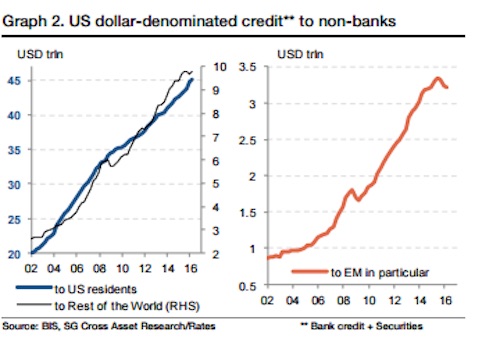
A slew of investment banks this week, including Deutsche Bank, Citigroup, Morgan Stanley and Societe Generale, reckon the pain for emerging markets will intensify in 2017, citing, in part, the rising cost of servicing dollar debts amid a strengthening greenback relative to local currencies, and higher Fed policy rates. “The [debt-servicing] challenge looks even fiercer for non-US borrowers who have borrowed in dollars — dollar strength will make it harder to repay the debt,” SocGen analysts, led by Brigitte Richard-Hidden, wrote in a report on Tuesday. “There are plenty of them, as the outstanding dollar-denominated credit to the rest of the world has more than doubled over the past 10 years to nearly $10 trillion,” analysts at the French bank conclude. “EM countries and corporations in particular have been keen on borrowing in dollars ([to the tune of] $3.2 trillion).”
At the heart of the challenge, according to analysts: a tighter U.S. trade position with the region in the coming years, which would shrink the pool of dollars floating overseas and make it harder for emerging markets to settle cross-border trade and service hard-currency debts. “Each of these sources of dollars – whether from trade, portfolio flows or debt issuance – could be at risk in the new post-election regime,” Deutsche Bank strategists, led by Mallika Sachdeva, wrote in a research note on Monday. “This could mean a reduction in trade surpluses in the region: exports could suffer from protectionist efforts.”
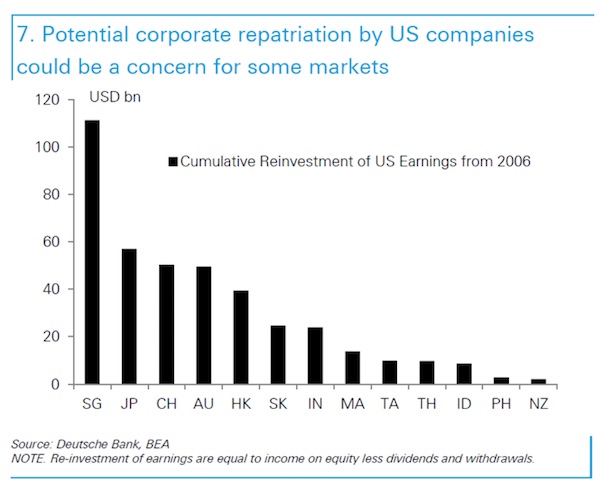

Much of the world is a Chinese property bubble, especially major cities.
• Property Bubble ‘Most Important Macro Issue In China’ – Deutsche (BI)
China’s debt-fuelled property boom, and potential bust, will be one of the biggest issues facing the country’s policymakers in 2017, according to Deutsche Bank. Deutsche Bank economists, led by Zhiwei Zhang and Li Zeng, said the real estate bubble is “the most important macro issue in China,” in a note to clients. They point to rapid hikes in land sales and auction prices, as well as mounting debt levels, as needing attention. Land sales accounted for more than a third of local government revenue, Deutsche Bank said, and mortgages made up 43% of all new loans issued in renminbi. The difference between the starting price and final price in land auctions continues to rise rapidly and “this shows some developers continue to expect sharp property price inflation to come,” the analysts said. Here’s the chart:

And here’s the debt chart showing sharp increases for this year:
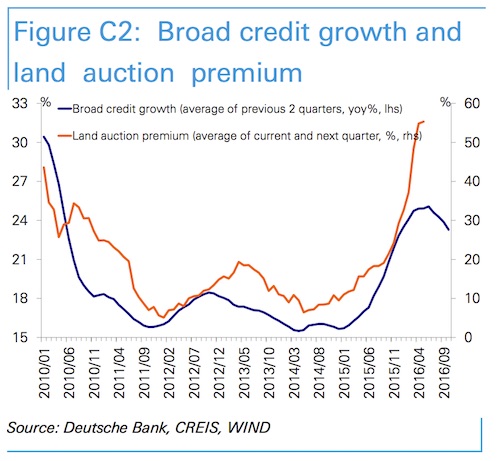
“Chinese policymakers are aware the market risks overheating and will act accordingly.” “In the next few months we believe the government will put further pressure on developers by tightening broad credit growth,” Zhang and Zeng said. “Property sales and investment growth will likely slow further in 2017Q1. Local government land revenue may weaken by 2017Q2.” On Monday analysts at Morgan Stanley raised the alarm about increased household borrowing, led by mortgages, in a note to clients. China’s debt to GDP rose to 276% in the third quarter this year from 249% in 2015. “This has been mainly driven by a rapid rise in new mortgages from RMB 1.7 trillion in 2014 to RMB 4.6 trillion in the past 12 months,” according to a note circulated to clients. With the debt overhang growing, the economic benefits of borrowing more are shrinking. It took nearly eight units of debt to produce one unit of GDP growth in 2016, compared with around four in 2014.

Want to bet?
• China’s Foreign Investment ‘Shopping Spree’ Over?! (SCMP)
The central government is embarking on a massive policy shift designed stem capital outflow by curbing mainland China’s outbound investment, sources informed of official instructions have told the South China Morning Post. Tighter control of outbound investment is likely to put an end to a trophy asset shopping spree by well-connected companies such as Anbang Insurance and Dalian Wanda, with Beijing is ready to cut the supply of foreign exchange for such deals. Shanghai’s municipal foreign exchange authority had told bank managers in the city that all overseas payments under the capital account bigger than US$5 million would have to be submitted to Beijing for special clearance before proceeding, the sources said. China’s central bank talks up the yuan against US dollar ‘uncertainties’
While the move did not necessarily mean all such deals would be vetoed, the regulatory procedures that would have to be navigated before completing them would take much longer, the sources said. A separate document seen by the Post, said to be the minutes of a central bank meeting on cross-border capital controls, said that from September next year Beijing would ban deals involving investment of more than US$10 billion, mergers and acquisitions valued at more than US$1 billion outside a Chinese investor’s core business, and foreign real estate deals by state-owned enterprises involving more than US$1 billion. [..] Mainland China’s foreign exchange reserves have fallen by US$873 billion since hitting an all-time high of US$3.99 trillion in June 2014. The reserves fell by US$46 billion last month, the largest monthly fall since January, but that understates the size of mainland China’s capital flight because residents are also moving yuan assets abroad.

It’ll be allowed to blunder on. TBTF.
• RBS Fails Bank Of England Stress Test (Ind.)
The Royal Bank of Scotland (RBS) has failed key hurdles in a Bank of England stress test, forcing the lender to draw up new plans in case of a financial crisis. The toughest stress test yet assessed how the UK’s seven biggest lenders would cope with hypothetical scenarios including a recession, a housing crash and a halving of the oil price. RBS, which is still 73% owned by the government after its bailout in 2008, has emerged as the worst hit in the annual health check of the banking system. This means the lender must take action to protect itself against a sharp slump in the economy. RBS has issued a plan intended to bolster its financial strength by an estimated £2bn, which has been accepted by the BoE.
The bank has also reduced its “risky” assets by £10.4bn or 21% to £38.6bn. Ewen Stevenson, RBS chief financial officer, said the bank is committed to creating a “stronger, simpler and safer” bank for their customers and their shareholders. He said: “We have taken further important steps in 2016 to enhance our capital strength, but we recognise that we have more to do to restore the bank’s stress resilience including resolving outstanding legacy issues.” Barclays and Standard Chartered also struggled under the test, however neither was required to submit a revised capital plan. The test also covered HSBC, Lloyds Banking Group, Santander and Nationwide.They did not reveal any capital inadequacies in the test, the BoE said.

“the big theme is the reduced confidence in the UK economy looking back and ahead..”
• UK Shoppers ‘Resolutely Gloomy’ About The Future Of The Economy (Ind.)
Shoppers are now “resolutely gloomy” about the country’s economic future and are putting off big purchases as uncertainty mounts, according to a respected survey. The GfK Consumer Confidence Barometer, which surveys 2,000 people, recorded a measure of –22 for confidence in the economy over the next year, down from -17 in October and –9 in September. A negative number means more people think things will get worse than vice versa. Major purchases took the biggest hit according to the report, with the index falling 9 points from 14 in October to 5 in November. People’s view of their personal financial situation over the next twelve months also fell. However, both measures are above their respective post-referendum nadirs.
Spending has so far kept up as buyers stock up on Christmas gifts but the prospect of sharply increasing prices, stagnant wages and further uncertainty over access to the UK’s single market have all weighed heavily on shoppers’ expectations over the past month. Earlier in November, the Bank of England made a dramatic rise to its inflation forecast, predicting it will almost triple from 1% to 2.7% in 2017 as the effects of a weakened pound are felt. National Institute for Economic and Social Research was even more pessimistic, saying it expected inflation to quadruple to about 4% in the second half of next year. Joe Staton, Head of Market Dynamics at GfK, said, “the big theme is the reduced confidence in the UK economy looking back and ahead. We are viewing our economy over the past 12 months with increasing despondency.” Staton said that “despite strong GDP numbers”, shoppers are “resolutely gloomy about the outlook” for the economy.

Me, I’m wondering where we are when everyone feels compelled to comment on such obvious nonsense. This morning when going through the news I kept on seeing photos of Trump and Romney having dinner. What’s the news? What’s the value? Don’t these people have more important things to do than to report on that?
• The ‘Washington Post’ ‘Blacklist’ Story Is Shameful and Disgusting (Taibbi)
Last week, a technology reporter for the Washington Post named Craig Timberg ran an incredible story. It has no analog that I can think of in modern times. Headlined “Russian propaganda effort helped spread ‘fake news’ during election, experts say,” the piece promotes the work of a shadowy group that smears some 200 alternative news outlets as either knowing or unwitting agents of a foreign power, including popular sites like Truthdig and Naked Capitalism. The thrust of Timberg’s astonishingly lazy report is that a Russian intelligence operation of some kind was behind the publication of a “hurricane” of false news reports during the election season, in particular stories harmful to Hillary Clinton. The piece referenced those 200 websites as “routine peddlers of Russian propaganda.”
The piece relied on what it claimed were “two teams of independent researchers,” but the citing of a report by the longtime anticommunist Foreign Policy Research Institute was really window dressing. The meat of the story relied on a report by unnamed analysts from a single mysterious “organization” called PropOrNot – we don’t know if it’s one person or, as it claims, over 30 – a “group” that seems to have been in existence for just a few months. It was PropOrNot’s report that identified what it calls “the list” of 200 offending sites. Outlets as diverse as AntiWar.com, LewRockwell.com and the Ron Paul Institute were described as either knowingly directed by Russian intelligence, or “useful idiots” who unwittingly did the bidding of foreign masters.
Forget that the Post offered no information about the “PropOrNot” group beyond that they were “a collection of researchers with foreign policy, military and technology backgrounds.” Forget also that the group offered zero concrete evidence of coordination with Russian intelligence agencies, even offering this remarkable disclaimer about its analytic methods: “Please note that our criteria are behavioral. … For purposes of this definition it does not matter … whether they even knew they were echoing Russian propaganda at any particular point: If they meet these criteria, they are at the very least acting as bona-fide ‘useful idiots’ of the Russian intelligence services, and are worthy of further scrutiny.”

How long would he remain alive though?
• US Intelligence Experts Urge Obama To End Snowden’s ‘Untenable Exile’ (G.)
The campaign to persuade Barack Obama to allow the NSA whistleblower Edward Snowden to return home to the US without facing prolonged prison time has received powerful new backing from some of the most experienced intelligence experts in the country. Fifteen former staff members of the Church committee, the 1970s congressional investigation into illegal activity by the CIA and other intelligence agencies, have written jointly to Obama calling on him to end Snowden’s “untenable exile in Russia, which benefits nobody”. Over eight pages of tightly worded argument, they remind the president of the positive debate that Snowden’s disclosures sparked – prompting one of the few examples of truly bipartisan legislative change in recent years.
They also remind Obama of the long record of leniency that has been shown by his own and previous administrations towards those who have broken secrecy laws. They even recall how their own Church committee revealed that six US presidents, from Franklin Roosevelt to Richard Nixon, were guilty of abusing secret powers. “There is no question that Snowden broke the law. But previous cases in which others violated the same law suggest leniency. And most importantly, Snowden’s actions were not for personal benefit, but were intended to spur reform. And they did so,” the signatories write. The Church committee, or the US Senate select committee to study government operations with respect to intelligence activities, to give it its full name, sat in 1975-76 at a time of deep public anxiety about the rogue work of federal agencies.
The aftershocks of Watergate were still being felt, and Seymour Hersh had exposed in the New York Times mass illegal activities by the CIA, including routine surveillance of anti-war groups. As the 15 staff members point out, the committee investigation led to the disclosure of jaw-dropping illegal acts including the planting of an FBI informant inside the civil rights group the NAACP, attempts to push Martin Luther King into killing himself, and Cointelpro, the vast program run secretly by the FBI to disrupt progressive organisations in the US.

Great little history lesson. Whether or not to agree with the assumptions behind it is another matter.
• The End Of Empires: Rome Vs. America (SHTFP)
The year was 451, and the battle of Chalons (also known as Catalaunian Fields and Campus Martius) was fought between a coalition of Roman legionnaires, Germanic Visigoths, and Gauls against the Huns. Flavius Aetius was the Roman commanding general, and he led his forces to defeat Attila, king of the Huns and commander of the Hun armies. The loss caused Attila to withdraw and skirmish into Italy, but again (this time through diplomacy and concessions) he withdrew in 452, returning into what is now modern Hungary. Attila died in 453, and the Hun menace to Europe had ended. Aetius had been the declining (and fragmented) Western Roman Empire’s best chance to restructure itself. He had fought in Gaul and throughout Italy and Europe for decades, sometimes even with support from the Huns before Attila began his quest for empire.
A master strategist, tactician, diplomat, and warrior, he effectively stemmed the collapse of the Western Roman Empire for another 25 years. In all probability, he may have been able to turn things around for a longer period of time. This was not to be, as he was assassinated by none other than the Emperor Valentinian III and his henchman Heraclius on 22 September 454. The emperor killed the very man who had protected and assured his throne, and worse: now there was no true strategist to take the reins of military command. The last great Roman general was no more, and the Western Roman Empire continued to decline and fragment. [..] Less than 25 years after the battle of Chalons had given it a fighting chance, the Western Roman Empire was no more. [..]And here we are, as history repeats itself, in the last days of the American Empire.
Now ready to assume the Purple and ascend to the seat of power, Donald Trump is going to command and lead (we hope). The campaigns for the midterm elections will begin in November of 2017, therefore Trump has less than one year to begin to reverse the devastation wrought by two consecutive Obama terms that have, in eight years, placed the country on its deathbed and measured it for burial. In a four-year term of office, Donald Trump has to do the job that Aetius did for Rome in two decades, with the last year of that term being wasted on the primary focus of his reelection. What is the difference between Rome and America? A vast geographical area, influxes of alien migrants, an economy that is faltering, a military less than at its best, immorality, vice, and corruption at every turn, societal degradation and a welfare state, and foreign nations ready to pounce characterize both empires.

“Hillary Clinton’s campaign was engineered from the get-go to complete the demolition of American manhood..”
• The Rediscovery of Men (Jim Kunstler)
Donald Trump was about as far from my sense of the male ideal as anything short of the Golem. His accomplishments in life — developing hotels that look like bowling trophies and producing moronic TV shows — seem as flimsy as the plastic golden heraldry plastered on his casinos. His knowledge of the world appears to be on the level of a fifth grader. He can barely string together two coherent sentences off-teleprompter. I was as astonished as anyone by the disclosure of his “grab them by the pussy” courtship advice to little Billy Bush. In my experience, it seemed a very poor strategy for scoring some action, to say the least. In a better world — perhaps even the America he imagines to have been great once — Donald Trump would be a kind of freak among men, a joke, a parody of masculinity.
But then consider the freak show that American culture has become in our time and it shouldn’t be surprising that a cartoon nation has ended up with a cartoon of a man as head-of-state. In fact, I doubt that there even is any remaining collective idea of what it means to be a man here in terms of the ancient virtues. Honor? Dignity? Patience? Prudence? Fuhgeddabowdit. The cultural memory of all that has been erased. The apotheosis of Trump may remind a few people of all that has been lost, but we’re starting from nearly zero in the recovery of it. Consider also the caliber of the male persons who stepped into the arena last spring when the election spectacle kicked off. Only Bernie Sanders came close to representing honorable manhood — in the form of your irascible old “socialist” uncle from Brooklyn — while the rest of them acted like Elmer Fudd, Mighty Mouse, and Woody Woodpecker. And then when the primary elections ended, Bernie drove a wooden stake into his own heart in a bizarre act of political hara-kiri.
Hillary Clinton’s campaign was engineered from the get-go to complete the demolition of American manhood in what turned out to be a reckless miscalculation. “I’m with her (and against him).” Too much in recent American history has been against “him” and a great many of the hims out there began to notice that they were being squeezed out of the nation’s life like watermelon seeds. Most particularly, men were no longer considered necessary in whatever remained of the family unit. This went against the truth of the matter, of course, because nothing has been more harmful to everyday life than the absence of fathers. And this was connected to the secondary calamity of men losing their roles in the workplace — and the loss of self-respect connected with that. So the election awakened some sleeping notion that life was wildly out of balance in America. And being so out of balance, it swung wildly in the other direction.

All major food firms are involved. Shun all products that contain palm oil. It’s incredibly damaging in many ways.
• Major Global Firms Buy Indonesia Palm Oil Produced By Child Labor (R.)
Global consumer companies, including Unilever, Nestle, Kellogg and Procter & Gamble, have sourced palm oil from Indonesian plantations where labor abuses were uncovered, Amnesty International said on Wednesday. Children as young as eight worked in “hazardous” conditions at palm plantations run by Singapore-based Wilmar International and its suppliers on the Indonesian islands of Kalimantan and Sumatra, Amnesty said in a report. Amnesty, which said it interviewed 120 workers, alleges that many of them worked long hours for low pay and without adequate safety equipment. The palm oil from these plantations could be traced to nine multinational companies, it said.
“Despite promising customers that there will be no exploitation in their palm oil supply chains, big brands continue to profit from appalling abuses,” said Meghna Abraham, senior investigator at Amnesty. The NGO said it chose Wilmar as the focus of its investigation as the company is the world’s largest processor and merchandiser of palm and lauric oils, controlling more than 43% of the global palm oil trade. Other companies operating palm plantations in Indonesia include Golden Agri-Resources, Indofood Agri Resources and Astra Agro Lestari.

What a blemish on the US this is.
• North Dakota Moves To Block Supplies From Reaching Pipeline Protesters (R.)
North Dakota officials on Tuesday moved to block supplies from reaching oil pipeline protesters at a camp near the construction site, threatening to use hefty fines to keep demonstrators from receiving food, building materials and even portable bathrooms. Activists have spent months protesting plans to route the $3.8 billion Dakota Access Pipeline beneath a lake near the Standing Rock Sioux reservation, saying the project poses a threat to water resources and sacred Native American sites. State officials said on Tuesday they would fine anyone bringing prohibited items into the main protest camp following Governor Jack Dalrymple’s “emergency evacuation” order on Monday. Earlier, officials had warned of a physical blockade, but the governor’s office backed away from that.
Law enforcement would take a more “passive role” than enforcing a blockade, said Maxine Herr, a spokeswoman for the Morton County Sheriff’s Department. “The governor is more interested in public safety than setting up a road block and turning people away,” Herr said by telephone. Officers will stop vehicles they believe are headed to the camp and inform drivers they are committing an infraction and could be fined $1,000. These penalties should serve as a hindrance, according to Cecily Fong, a spokeswoman for the North Dakota Department of Emergency Services. “So that effectively is going to block that stuff (supplies), but there is not going to be a hard road block,” Fong said by telephone.

One can be quite specific here. Insurers so far don’t act because the government doesn’t.
• The Areas America Could Abandon First (BBG)
So far this year, the Federal Emergency Management Agency has spent $1.1 billion on what are called Individual Assistance payments, which help households recover from natural disasters. There are no limits on the number of times a household can apply, so the program isn’t just a safety net; for some people, it’s effectively a subsidy to live in areas that are especially vulnerable to hurricanes, floods and storm surges. That hasn’t gone unnoticed in Washington. In 1999, a Nebraska congressman introduced a bill preventing some properties with multiple claims from getting help – not just disaster relief, but also subsidized flood insurance. Two years later, the George W. Bush administration’s first budget proposed denying aid to the “worst offending repetitive loss properties.”
Under President Barack Obama, FEMA proposed reducing disaster aid for public buildings damaged more than once in the previous decade if local governments hadn’t done anything to protect them. None of those proposals took effect. But as extreme weather gets worse, those federal subsidies will only become more expensive – increasing the need to rethink government support for those who choose to live in harm’s way. “Climate change is real and will lead to even more frequent and costly disasters,” Rafael Lemaitre, FEMA’s director of public affairs, told me. “We must continue to work with states to implement longer-term projects and strategies that mitigate against climate change.” That means it’s time to consider an impolitic question: If federal support gets rolled back, which areas will people have the greatest incentive to leave?
To answer that, I asked FEMA which parts of the country have the most households that repeatedly get Individual Assistance payments, which are a useful proxy for exposure to all types of extreme weather. The agency gave me a list of 1,930 counties where at least one address had requested such aid more than once since 1998 – 1.3 million households in total. That data, which the agency said it had never before compiled, is reflected in the graphic below; the shading represents the number of households per capita that have applied for FEMA aid multiple times.
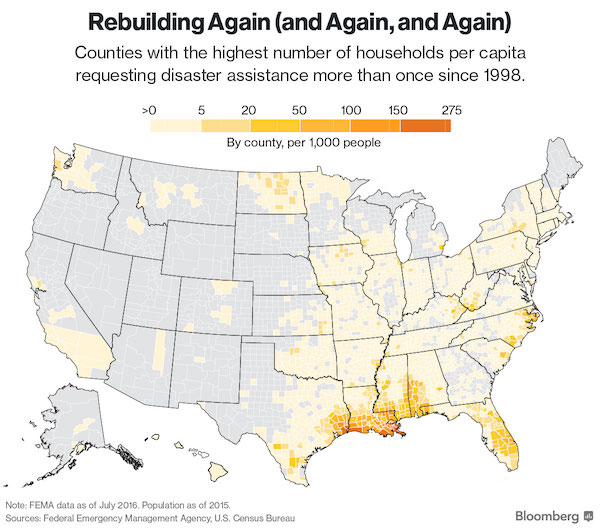
Unsurprisingly, the areas where households are most likely to repeatedly request aid are generally along coasts. The surprise is how they’re distributed: Rather than being spread uniformly along shorelines, a small number of counties account for the most repeat claims – one more reminder that the burden of climate change will not fall evenly. That’s also true within the most affected counties. The charts below show the number of households per capita requesting disaster aid more than once since 1998, by ZIP code, for four areas with especially high concentrations of repetitive claims. These charts don’t just map the losers from any reduction in federal support: At a more basic level, they show some of the places Americans will face the most pressure to abandon because of extreme weather — at least, people who can’t afford the full cost of recovering from natural disasters.
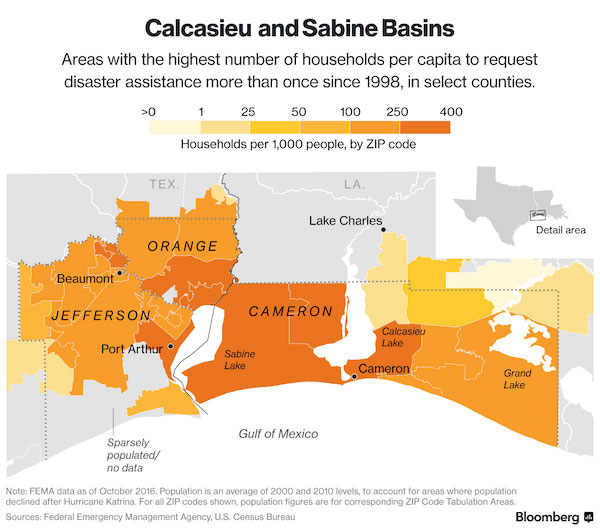

Unverified, but not at all unlikely.
• Turkey Has Secret Plan To Send 3,000 Refugees To Greece Every Day (Ind.)
The Turkish government has a secret plan to allow 3,000 refugees to sail to Greece every day, intelligence officials have claimed. Greek analysts claim thousands of dinghies and motorboats have massed along the Turkish coast as the refugee deal agreed between Ankara and Brussels looks set to unravel. Turkish President Erdogan threatened to open the borders if the EU continued to block talks on the country’s accession to the union. The European Parliament voted to temporarily halt membership talks amid concerns about the brutal crackdown on dissent in the country following an attempted military coup in July. Mr Erdogan warned: “If you go any further, these border gates will be opened.
Neither me nor my people will be affected by these dry threats. It wouldn’t matter if all of you approved the vote”. The deal reached in March meant any refugee who arrived on Italian or Greek shores would be sent back to Turkey in exchange for EU member countries accepting another refugee from a Turkish camp on a “one for one” basis. Ankara will also received aid money to help it care for the refugees within its borders, visa free travel for its citizens and the speeding up of membership talks. But according to Greek newspaper Proto Thema, Ankara has given up on hope of Brussels living up to its side of the deal and could start allowing the refugees to flee “within a matter of weeks”.
Greek intelligence expert Athanassios Drougas told The Times: “No one is underestimating Mr Erdogan and his unpredictability these days. “These plans, along with explicit threats that the Turkish president has made in recent weeks, have Greece’s joint chiefs of staff seriously concerned. “They are fearful and they have told the political leadership here that if Turkey opens the floodgates yet again, Greece, in its current state of financial and social distress, will not be able to withstand the shock. It will spell war or wreak the havoc of one. “With Europe in a mess, Mr Erdogan feels he has a free hand in trying to blackmail the bloc using the refugee crisis as leverage.”









Home › Forums › Debt Rattle November 30 2016